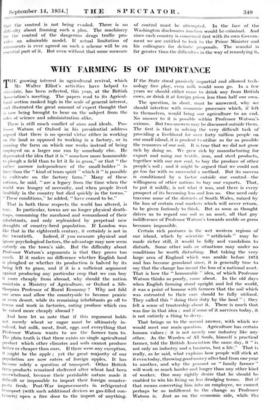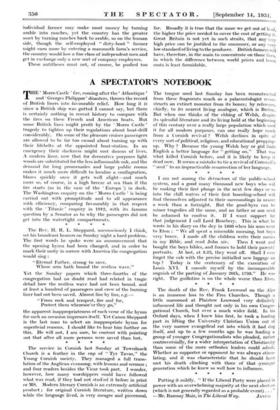WHY FARMING IS OF IMPORTANCE
THE growing interest in agricultural revival, which Mr. Walter Elliot's activities have helped to stimulate, has been reflected, this year, at the British Association's meeting. The papers read to its Agricul- tural section ranked high in the scale of general interest, and illustrated the great amount of expert. thought that is now being brought to bear on the subject from the sides of science and administration alike.
There is still much conflict of aims and ideals. Pro- fessor Watson of Oxford in his presidential address argued that there is no special virtue either in working on the land as opposed to working in a factory, or in running the farm on which one works instead of being employed on a larger one run by somebody else. He deprecated the idea that it is " somehow more honourable to plough a field than to let it lie in grass," or that " the rather narrow independence of the small-holder " is liner than the " kind of team spirit " which it " is possible to cultivate on the factory farm." Many of these notions, he said, " are a legacy from the time when the world was hungry of necessity, and when people lived healthily in the country but died quickly in the towns."
These conditions," he added, " have ceased to be."
That in both these respects the world has altered, is true. In particular, towns are no longer physical death- : traps, consuming the manhood and womanhood of their inhabitants, and only replenished by perpetual new draughts of country-bred population. If London was like that in the eighteenth century, it certainly is not in the twentieth. Indeed, if you measure physical 'and ignore psychological factors, the advantage may now seem entirely on the town's side. But the difficulty about Professor Watson's arguments is that they prove too much. If it makes no difference whether English land is ploughed or whether its production is halved by its being left to grass, and if it is a sufficient argument against producing any particular crop that we can buy it more cheaply from abroad, why should the nation maintain a Ministry of Agriculture, or Oxford a Sib- thorpian Professor of Rural Economy ? Why not fold our arms and allow the countryside to become prairie or even desert, while its remaining inhabitants go off to towns and work in factories, eating produce which can be raised more cheaply' abroad ? • And here let us note that if this argument holds not merely wheat or sugar must be ultimately in- volved, but milk, meat, fruit, eggs and everything that Professor Watson wants to see the farmer turn to. The plain truth is that there exists no single agricultural product which other climates and soils cannot produce better or cheaper than ours. If there were any exception, it. might 'be the apple ; yet the great- majority of our Population are now eaters of foreign apples. It has become §olely "a question Of transport. Other British farm-products` remained sheltered after wheat had• been overwhelmed, because their perishable nature made it difficult or 'impossible to import their foreign counter- parts fresh:. Post-War improvements 'in refrigerated transport' (with' such additional devices as gas-filled con= tainers) open a free door to the import of anything: If the State stood passively impartial and allowed tech- nology free play, even milk would soon go. In a few years we should either cease to drink any from British cows, or drink it at foreign prices less than half our own.
The question, in short, must be answered, why we should interfere with economic processes which, if left to themselves, would bring our agriculture to an end. No answer to it is possible within Professor Watson's axioms. But two answers may be discussed outside them. The first is that in solving the very difficult task of providing a livelihood for over forty million people on our small island, it is prudent to utilize as far as possible the resources of our soil. It is true that we did not grow rich by doing so. We grew rich by manufacturing for export and using our textile, iron, and steel products, together with our raw coal, to buy the produce of other people's soil ; and it might be argued that we could not go too far with so successful a method. But its success is conditioned by a factor outside our control—the willingness of other nations to buy our exports. That, to put it mildly, is not what it was, and there is every prospect of its becoming less and less so. One need only traverse some of the districts of South Wales, ruined by the loss of certain coal markets which will never return, to be given furiously to think. But as soon as thought drives us to regard our soil as an asset, all that gay indifference of Professor Watson's towards arable or grass becomes impossible.
Certain rich pastures in the wet western regions of our island, which by scientific " artificials " may be- made richer still, it would be folly and vandalism to distUrb. Some other soils or situations may under no conditions be worth disturbing. But taking the very large area of England which was arable before 1875 and has become grassland since, it is generally true to say that the change has meant the loss of a national asset. That is how the " honourable " idea, of which Professor Watson thinks so poorly, came about. In the old days when English farming stood upright and led the world, it was a point of honour with farmers that the soil which was entrusted to their care should be fully utilized. They called this " doing their duty by the land " ; they felt a sense of trusteeship about it. There is much that was fine in that idea ; and if some of it survives today, it is not entirely a thing to decry.
That brings us to the second answer, with which we would meet our main question. Agriculture has certain human values ;• it is not merely one industry like any other. As the Warden of All Souls, himself a practical farmer, told the British Association the same day, it " is not only an industry and a business, but a life." That is really, as he said, what explains how people will stick at it even today, throwing good money after bad from one year to another, and why the peasant or " family farmer " will work so much harder and longer than any other kind of worker. One may rightly desire that he should be enabled to win his living on less drudging terms. But if that means converting him into an employee, we cannot perhaps be so indifferent to the change as Professor Watson is. Just as 'on the economic side, while the individual farmer may make most money by turning arable into ranches, yet the country has the greater asset by turning ranches back to arable, so on the human side, though the self-employed " dirty-boot " fanner might earn more by entering a mammoth farm's service, the country would lose a fine class of independent men and get in exchange only a new sort of company employees.
These antitheses must not, of course, be pushed too far. Broadly it is true that the more we get out of land, the higher the price needed to cover the cost of getting it. Great Britain is not yet in such straits, that any very high price can be justified to the consumer, or any very low standard of living to the producer. British farmers will have, therefore, in the main to concentrate on those lines, in which the difference between world prices and home costs is least formidable.











































 Previous page
Previous page